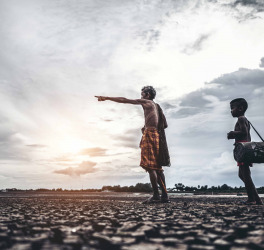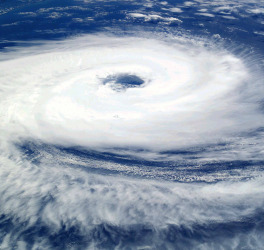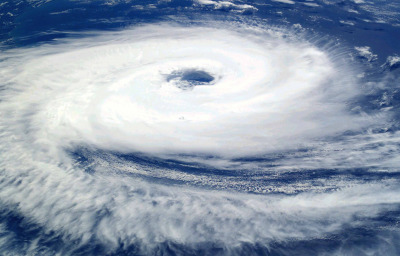
Weather and climate conditions over the Indochina Peninsula, including Cambodia and Lao People’s Democratic Republic (PDR), make it one of the most vulnerable regions on the planet.
Climate change and variability add a layer of uncertainty with more intense dry seasons, wetter monsoons, intensifying floods and storms, and rising sea levels. The 2020 storm season was one of the most active in history, with Typhoons Molave, Goni, and Vamco making landfall just three weeks apart, resulting in severe flooding, landslides, and loss of life and damaged property across the region.
A new project in Cambodia and Lao PDR was announced last week by countries engaged in the Climate Risk and Early Warning Systems (CREWS) Initiative. The four-year, US$ 5.5 million project is led by national institutions and will enhance their capacities to provide hydrometeorological, early action, and response services to vulnerable populations in Cambodia and Lao PDR. These efforts are being supported by WMO, the UN Office for Disaster Risk Reduction (UNDRR), and the World Bank Global Facility for Disaster Reduction and Recovery (WB-GFDRR). Expected completion is July 2025. The project builds upon ongoing initiatives in the region and actively engages with key regional stakeholders.
Dr. Pedro Basabe, Senior Regional Disaster Risk Reduction and Rapid Response Advisor, and Head, SDC-HA Hub for Southeast Asia and the Pacific said, “Without people-centred multi-hazard early warning systems, disaster impact will continue to increase. The new CREWS project in Cambodia and Lao PDR is welcome and expected to fulfil this task by further developing institutional and technical capacities, coupled with sustainable coordination mechanisms, methodologies, tools and communication to reach the last mile, while improving people preparedness capacities. Switzerland through its SDC regional Hub in Bangkok is pleased to support this activity while contributing to the implementation of the Sendai Framework target G and the ASEAN Agreement on Disaster Management and Emergency Response (AADMER).
Through the duration of the project, the National Meteorological and Hydrological Services (NMHSs) and National Disaster Management Offices (NDMOs) of both countries, with support from regional partners, will address current gaps across the four pillars of their early warning systems: Risk Knowledge, Monitoring and Warning Services, Dissemination and Communication and Response Capability.
Results are expected in the following areas:
- Strengthened institutions, operational and legal frameworks;
- Capacity of NMHSs to provide more timely and precise forecasts and warnings;
- Ability to disseminate warning to the people and institutions that need them most, through information and communication technology of the national services;
- Enhanced preparedness and response capability; and
- Improved integration of gender and disability inclusiveness to ensure early warnings are developed with and reach all relevant stakeholders.
The official launch of the project is planned to take place in October 2021 and will bring together key national and regional participants in the project.
Ben Churchill, Head of WMO Regional Office, Asia and Southwest Pacific stated, “This support from CREWS comes just at the right time, as it enables us to continue to build upon past and ongoing initiatives which have built the foundations for strengthening end-to-end EWS in Cambodia and Lao PDR. The planned activities will sufficiently address the needs and priorities of the countries and are well aligned with ongoing WMO programmes within the region whilst leveraging support from the WMO Regional Forecast Support Centre (RFSC) in Ha Noi, Vietnam.
For more information, go to https://public.wmo.int






